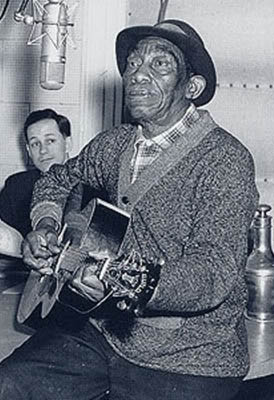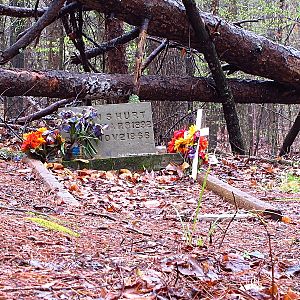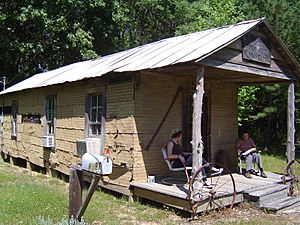Mississippi John Hurt facts for kids
Quick facts for kids
Mississippi John Hurt
|
|
|---|---|

Hurt making a recording for the Library of Congress in July 1963
|
|
| Background information | |
| Birth name | John Smith Hurt |
| Born | March 8, 1893 Teoc, Mississippi, United States |
| Origin | Avalon, Mississippi |
| Died | November 2, 1966 (aged 73) Grenada, Mississippi, US |
| Genres | Country blues, delta blues, folk |
| Occupation(s) | Singer-songwriter, sharecropper, farm hand |
| Instruments | Guitar, vocals |
| Years active | 1901–1966 |
| Labels | Okeh Vanguard |
| Associated acts | Shell Smith Willie Narmour |
John Smith Hurt (born March 8, 1893 – died November 2, 1966), known as Mississippi John Hurt, was an American country blues singer and guitar player.
He grew up in Avalon, Mississippi. John Hurt taught himself to play the guitar when he was about nine years old. He worked as a farmer and played music at local dances and parties. He sang while playing the guitar in a special fingerpicking style. His first songs were recorded in 1928 for Okeh Records, but they did not sell well. So, he went back to farming.
In 1963, a music fan named Tom Hoskins and a music expert, Dick Spottswood, found John Hurt. They convinced him to move to Washington, D.C. The Library of Congress recorded his music in 1964. This helped bring back interest in American folk music and other blues musicians from his time. John Hurt started playing concerts at colleges and coffeehouses. He also recorded several albums for Vanguard Records.
John Hurt returned to Grenada in 1966. He passed away there at the age of 73. Many artists like Bob Dylan and Taj Mahal have recorded his songs.
Contents
About John Hurt's Life
Early Years and Learning Music
John Hurt was born in Teoc, in Carroll County, Mississippi. He grew up in Avalon, Mississippi. He taught himself to play the guitar when he was nine. He would secretly play the guitar of a friend of his mother's. As a young person, he played old-time music for his friends and at dances. He worked on farms until the 1920s.
His guitar playing style was fast and had a special rhythm called syncopation. It was perfect for dancing. Sometimes, a traveling medicine show would come through his area. John Hurt remembered that one show wanted to hire him. But he said no because he did not want to leave home. In 1923, he played with a fiddle player named Willie Narmour.
First Time Recording Songs
Willie Narmour won a fiddle contest in 1928. His prize was a chance to record for Okeh Records. He told the record producer, Tommy Rockwell, about John Hurt. After listening to Hurt play a song called "Monday Morning Blues" at his home, John Hurt recorded songs in Memphis and New York City.
While in Memphis, he saw many other blues singers. He remembered seeing Lonnie Johnson, Blind Lemon Jefferson, and Bessie Smith. John Hurt tried to record more songs with Okeh, but his first records did not sell well. Okeh Records went out of business during the Great Depression. So, John Hurt went back to Avalon and continued farming. He played music only at local parties and dances.
Being Discovered Again
Two of John Hurt's songs, "Frankie" and "Spike Driver Blues", were put on a famous album in 1952. This made many people want to find him. In 1963, a copy of his song "Avalon Blues" was found. This helped music expert Dick Spottswood find Avalon, Mississippi, on a map. He asked Tom Hoskins to look for John Hurt there.
When Tom Hoskins found John Hurt, he asked him to play some songs to make sure it was really him. Hoskins was sure it was him and saw that Hurt could still play guitar very well. He encouraged John Hurt to move to Washington, D.C., to play for more people. He played at the 1963 Newport Folk Festival. This made him famous during the folk revival of that time. Soon after, in 1964, he recorded live for radio with Skip James.
For a few years, John Hurt played many concerts at colleges and coffeehouses. He even appeared on The Tonight Show Starring Johnny Carson. He also recorded three albums for Vanguard Records. Many of his songs were also recorded for the Library of Congress. His fans especially loved his ragtime songs like "Salty Dog" and "Candy Man." They also liked his blues songs "Spike Driver Blues" and "Frankie."
John Hurt's music influenced many different types of music. These included blues, spirituals, country, bluegrass, folk, and rock and roll. He was a quiet man, and his music showed that. It was a gentle mix of country, blues, and old-time music.
John Hurt died on November 2, 1966, from a heart attack in a hospital in Grenada, Mississippi. His last songs were recorded in New York City in 1966. They were released later in 1972 on an album called Last Sessions.
His Unique Music Style
John Hurt taught himself a fast, rhythmic fingerpicking style of guitar playing. He was not influenced by many other musicians. One person he listened to was an older blues singer named Rufus Hanks. Rufus played a twelve-string guitar and harmonica. John Hurt also remembered listening to the country singer Jimmie Rodgers. Sometimes, John Hurt would use a special guitar tuning and a slide. He did this in his song "The Ballad of Casey Jones".
Honoring John Hurt
There is a special memorial for John Hurt in Avalon, Mississippi. It is near the road where he grew up.
The singer-songwriter Tom Paxton met John Hurt and played with him around 1963. In 1977, Tom Paxton wrote a song about him called "Did You Hear John Hurt?".
The first song on John Fahey's 1968 guitar album Requia is "Requiem for John Hurt". Another album by Fahey also has a version of this song.
The British folk artist Wizz Jones recorded a song called "Mississippi John" in 1977.
The blues artist Rory Block released an album called Avalon: A Tribute to Mississippi John Hurt in 2013.
In 2017, John Hurt's life story was shown in a TV show called American Epic. The show included videos of Hurt performing and talking. It also had better versions of his old recordings from the 1920s. The director, Bernard MacMahon, said that John Hurt was the reason he made American Epic.
His Recorded Music
Original 78-rpm Records
- "Frankie" / "Nobody's Dirty Business" (Okeh Records, Okeh 8560), 1928
- "Stack O' Lee" / "Candy Man Blues" (Okeh Records, OKeh 8654), 1928
- "Blessed Be the Name" / "Praying on the Old Camp Ground" (Okeh Records, OKeh 8666), 1928
- "Blue Harvest Blues" / "Spike Driver Blues" (Okeh Records, OKeh 8692), 1928
- "Louis Collins" / "Got the Blues (Can't Be Satisfied)" (Okeh Records, OKeh 8724), 1928
- "Ain't No Tellin'" / "Avalon Blues" (Okeh Records, OKeh 8759), 1928
Albums Released
- Folk Songs and Blues (Piedmont Records, PLP 13157), 1963
- Worried Blues, live recordings (Piedmont Records, PLP 13161), 1964
- Today! (Vanguard Records, VSD-79220), 1966
- The Immortal Mississippi John Hurt (Vanguard Records, VSD-79248), 1967
- The Best of Mississippi John Hurt, live recording from Oberlin College, April 15, 1965 (Vanguard Records, VSD-19/20), 1970
- Last Sessions (Vanguard Records, VSD-79327), 1972
- Volume One of a Legacy, live recordings (Piedmont Records, CLPS 1068), 1975
- Monday Morning Blues: The Library of Congress Recordings, vol. 1 (Flyright Records, FLYLP 553), 1980
- Avalon Blues: The Library of Congress Recordings, vol. 2 (Heritage Records, HT-301), 1982
- Satisfied, live recordings (Quicksilver Intermedia, QS 5007), 1982
- The Candy Man, live recordings (Quicksilver Intermedia, QS 5042), 1982
- Sacred and Secular: The Library of Congress Recordings, vol. 3 (Heritage Records, HT-320), 1988
- Avalon Blues (Flyright Records, FLYCD 06), 1989
- Memorial Anthology, live recordings (Genes Records, GCD 9906/7), 1993
Selected Collection Albums
- The Original 1928 Recordings (Spokane Records, SPL 1001), 1971
- 1928: Stack O' Lee Blues – His First Recordings (Biograph Records, BLP C4), 1972
- 1928 Sessions (Yazoo Records, L 1065), 1979
- Satisfying Blues (Collectables Records, VCL 5529), 1995
- Avalon Blues: The Complete 1928 Okeh Recordings (Columbia Records, CK64986), 1996
- Rediscovered (Vanguard Records, CD 79519), 1998
- The Complete Recordings (Vanguard Records, CD 70181–2), 1998
- Candy Man Blues: The Complete 1928 Sessions (Snapper Music, SBLUECD 010), 2004
- American Epic: The Best of Mississippi John Hurt (Lo-Max / Sony Legacy / Third Man, TMR-459), 2017
See also
 In Spanish: Mississippi John Hurt para niños
In Spanish: Mississippi John Hurt para niños
 | Shirley Ann Jackson |
 | Garett Morgan |
 | J. Ernest Wilkins Jr. |
 | Elijah McCoy |



